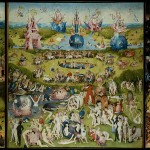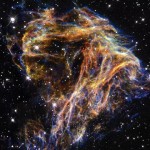Yesterday, I posted some thoughts on how the book of Genesis seems, so frequently to mirror John’s Gospel, at least in the beginning, and assigned myself the task of spending Lent prayerfully reading both books, “side-by-side”, so to speak.
Then I read our tireless, ever-working Pope Benedict’s splendid remarks to his general audience, this morning, and it seems Papa is looking deeply at Genesis this week, too! And he has some wonderful things to say to us about creation, freedom, sin and love
The whole talk is so good it’s difficult to excerpt, but here is a little of it:
I would like to highlight one last instruction from the stories of creation: sin begets sin and the sins of history are interlinked. This aspect pushes us to discuss that which is termed “original sin.” What is the meaning of this reality, often difficult to understand? I would like to illustrate some elements. First, we must consider that no man is closed in on itself, no man can live only in and of himself; we receive life from the other and not only at birth, but every day. The human being is relational: I am myself only in you and through you, the relationship of love with the You of God and the you of others. Well, sin upsets or destroys our relationship with God, its presence destroys our relationship with God, the fundamental relationship, when we put ourselves in Gods place. The Catechism of the Catholic Church states that with the first sin, man, “chose himself over and against God, against the requirements of his creaturely status and therefore against his own good.”(n. 398).
Once the fundamental relationship is upset, the other poles of relationships are compromised or destroyed, sin ruins everything. Now, if the relational structure of humanity is troubled from the start, every man walks into a world marked by the disturbance of this relationship, enters a world disturbed by sin, by which he is marked personally; the initial sin attacks and injures human nature (cf. Catechism of the Catholic Church, 404-406). And man can not get out of this situation alone, he can not redeem himself alone, only the Creator can restore the right relationship. Only if the One from which we have strayed comes to us and takes us by the hand with love, can the right relationship be re-woven. This happens in Jesus Christ, who takes the exact opposite path to that of Adam, as the hymn in the second chapter of the Letter of St. Paul to the Philippians describes (2:5-11): while Adam does not recognize his being a creature and wants to put himself in the place of God, Jesus, the Son of God, is in a perfect filial relationship with the Father, he lowers himself, becomes the servant, he travels the path of love humbling himself to death on the Cross, to reorder relations with God. The Cross of Christ becomes the new Tree of Life.
I am printing this out and keeping it to re-read as I begin my Lenten project. It’s certainly worth taking in slowly. Graci, Papa.












